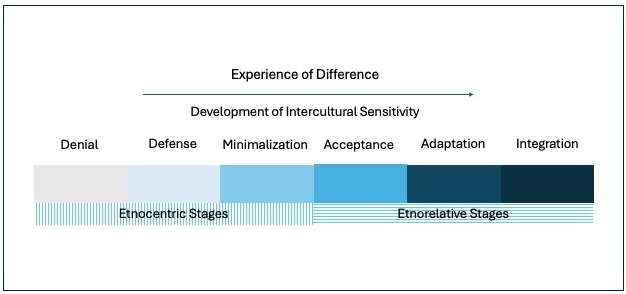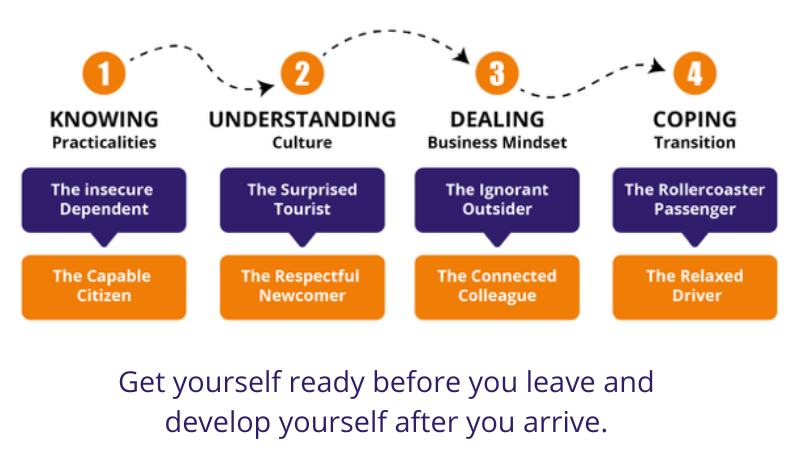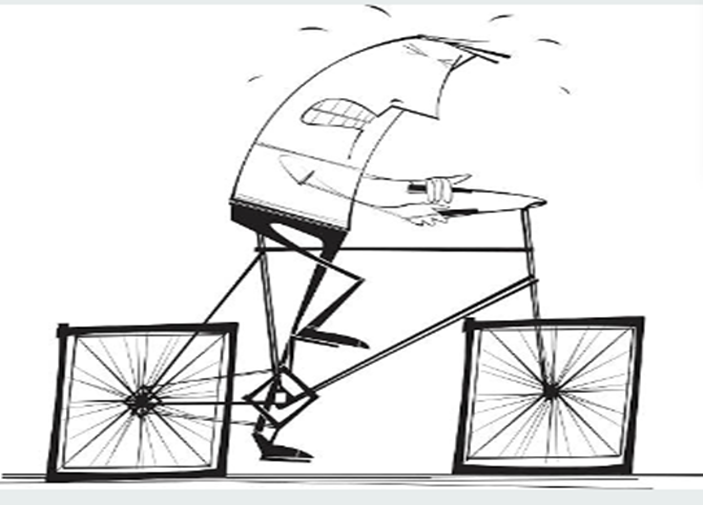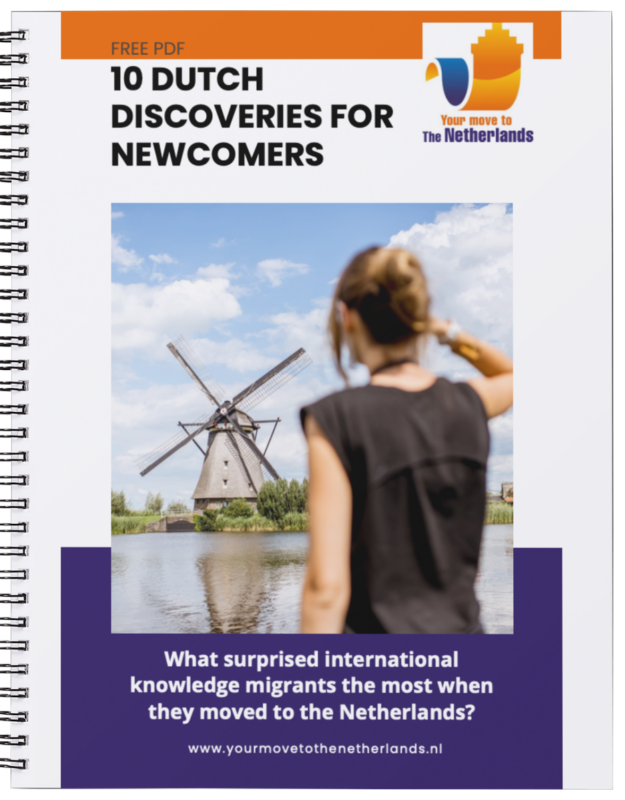
No bad aftertaste: Make it a success story you can enjoy for the rest of your life.
Many international knowledge workers underestimate the impact of their Move to the Netherlands and overestimate their ability to adapt.
On a yearly base around 26.000 highly educated knowledge migrants come to the Netherlands.
The country needs these people, because too many jobs are vacant and are not fulfilled by Dutch people. The Netherlands is seen as an attractive country to many foreigners. So if there is a match, then you would say it is a win- win at first sight. But…
Unfortunately, in many cases the outcome is not as fortunate as hoped. Practice often turns out differently. In many cases this has to do with underestimation and lake of preparation. In this article I will explain what, why and how to avoid these mistakes.
Before I start one important remark: in this article I assume you already have a job or a sponsor to come to the Netherlands. If not, then it is wise to first learn more about that. It is not wise to come to the Netherlands before you have a job contract, acknowledged sponsor or other legitimate base to come to the Netherlands.
 Some misconceptions that go around:
Some misconceptions that go around:
- The Netherlands has the reputation of being an easy-going country with tolerance and free morals. “If they deal so smoothly with abortion, euthanasia, prostitution and coffee shops, then settling in the Netherlands will be easy. So, everything will be fine for me.”
- In the Netherlands, many people can speak English, so you don't have to learn Dutch.
- It will not be difficult to live and work successfully in the Netherlands.
- It won't go bad, everything will be fine.
- Once I get there, it will be self-explanatory. I'm a highly educated, capable professional, right? I always manage.
- Look what kind of career I already built. I faced bigger challenges. Everything will be fine.
Many future expats who come to the Netherlands have these kinds of ideas. And then it's disappointing. It turns out not to be all that easy.
- First, there is a lot of bureaucracy and regulations. Even though you fit the criteria to be permitted to come to the Netherlands (if you are not sure, please find out before you come). You must jump through many hoops to get things in order administratively. Online registrations, application forms, registrations. Endless. Usually, it is not possible to get to speak to a person, many processes are standardized and computerized.
- And then it turns out to be disappointing with the English language. You can easily get around with English as a tourist, but living in the Netherlands is another chapter. Many forms are in Dutch and many terms are unknown and difficult to translate into English to make them understandable for you. Also, in the workplace in many companies Dutch is the primary language and often it is mandatory to speak Dutch to get a skilled job.
- What people forget is the cultural aspect of the new environment, the new country. You grew up in your home country. Everything you achieved there happened within an environment that was familiar to you. When you move to a new country, the rules of the game change.
Become a member of My Dutch Homebase community
It all starts with the basics. Trivial things from everyday life. That must be in order first. This is what Maslov taught us. The basic needs must first be in order before you can move on to higher-level needs.
Many expats are surprised by how the basic practical things drain their energy and lead to frustration.
It starts right at the start. Arranging the paperwork. Visas and legal matters. To live and work in the Netherlands as a knowledge migrant you need the necessary permits. The Netherlands suddenly appears to be quite bureaucratic. There are many procedures and rules. If you don't know them, you'll run into walls. Going along is the only thing that offers a solution.
I remember a client who wanted to be completely committed to do a cultural training but who could not stay focused simply because her internet at home did not work and she did not know how to solve the problem. The solution: We solved her internet issue for and she was all ears for the course.
- Where should I live? is the next question. In the Netherlands it is not that easy. Ultimately, it matters a lot where you live. Close to your work? Or more in a city. Your daily environment makes a big difference in how much quality of life you experience. What suits you? Yes, the Netherlands is a small country, but traveling 2 hours to and from work every day is not what you want in the end. It often starts with renting. The landlord suddenly becomes an essential part of your life. Especially in the beginning. You may be lucky, but the stories of Dutch landlords who put profit at the top of their priority list can sometimes be less focused on the quality of life of tenants. After a while, many feel the need to buy their own home. That's a next episode in your expat life. This may not be a big job in your own country, but abroad, where you do not know the rules and customs of the housing market, it can quickly become a major challenge to find, acquire and live in something suitable. There's a lot more to it than you might expect.

- School for the children is often related to the topic of where to live. Usually living close to school is more important than close to the job. And what school to pick? Do you go for a Dutch school, so the children integrate, or will it be an international school, so it is easier to adjust to from where you come from or because you are not certain if the Netherlands will be your base for the long term?
- Medical care is another aspect that you must go through. And you just don't feel like doing that. But if you really need it, you're already too late. The same goes for insurance. You must go into that whole administrative machine and get it in place before you actually need it.
- Expats often need financial advice regarding taxes, insurances, mortgages and investments, especially if Dutch rules and laws differ from those in their home country. If not in the beginning, then it is very useful after a while. And, whom to turn to? Advisors in your home country are usually not familiar with the Dutch situation and your situation as an expat usually differs from the situation of a Dutch family, so you need help from an expert who knows about important aspects for an international living in the Netherlands.
- Language is also an aspect about which there are misunderstandings. Certainly, with English you can go to many places, but when it comes to really feeling at home, language suddenly turns out to be a crucial factor. There are exceptions, but after a while many people feel the need to connect with the Dutch population. Language is important in this.
Two times a culture shock!
What many expats discover in person is the existence of culture shock. Many people have heard of this but experiencing it yourself in real life is a different story. The literature shows that there are two moments of culture shock. The first in the beginning, just after arrival and a second usually a few months later. And they are somewhat different in nature.
The first shock
The first culture shock is that of practical matters. Arranging all practical matters takes a lot of energy and is often frustrating. At a certain point the mental stretch is over. Then doubt sets in. Why did I want this again? What a hassle. I have to get through it, but it's so exhausting.
The second shock
The second culture shock is about belonging. A basic human need. This is put to the test when you live abroad. Other expats will feel closest, but you really must be careful with that. ‘What you interact with, you become infected with’ is often said. If you end up in a network of complaining expats who are in 'defense mode', then you have a problem. That can become an energy drain, and it will not help you get connected to the country you live in.
 The Developmental Model of Intercultural Sensitivity (DMIS) was created by Dr. Milton Bennett
The Developmental Model of Intercultural Sensitivity (DMIS) was created by Dr. Milton Bennett
Based on the Developmental Model of Intercultural Sensitivity (DMIS) of Milton Bennett, there are two ways to approach a culture you are not familiar with. You can focus on your own culture (‘my way is the way to do things’) or you can place your way equally next to the new culture (‘my familiar way of doing things is just one way of doing it and there are other ways possible’). It is no rocket science to see that the second approach gives better ways to connect with a different culture.
Most of us need people to feel connected and safe. That is a human need. For expats, this need is put to the test. Where do I belong? Who are my peers? Colleagues at my work? Neighbors? Other expats?
And what about the partner who moves along? They often don’t have a job from the start, so they don't have that corporate culture to lean against. They really are “on their own”.
Do I belong to the expats in the Netherlands, especially the ones coming from my home country? Do I join local communities? Expats will understand you better. The local community often feels a bit further away in terms of perception. What to do? A double paradox. If I focus on the expat community, that is easier, but I do not integrate. If I focus on the local community, I don't feel connected, even though that is the way to ultimately feel at home sustainably. To feel at home, you have to come into contact with the culture. But you don't feel at home there, because it is different from who you are. This often plays a role in the second culture shock: who am I and where do I belong?
Life is not all about work. The Netherlands is famous for an emphasis on work-life balance. A relief for many expats. But it also means that you must work yourself to be aware of local recreational opportunities, cultural events, sports clubs and other leisure activities to build social contacts and enjoy yourself. Do you focus on Dutch or international networks? Considerations I have to make.
In short, your life becomes more complex than before.
Become a member of "My Dutch Homebase" community
The crucial challenges to face
In over 10 years of working with expats I have seen what challenges people face and which crucial steps need to be taken to be able to make a move successful.
Over and over, it is clear that people have 4 areas of challenges to deal with:
- Practical issues
- Cultural differences
- Business in the Netherlands
- Coping with the transition

You can already learn a lot before you make the move. Many expats that took a course on these subjects after they arrived in the Netherlands said afterwards: “I wish I had known this before!”, “This explains al lot and I would not have had to go through so much trouble and frustration!”

The issue is though that once you arrive in the Netherlands you are so busy you will not have time to take a course, so by the time you are able, you have already spent a lot of time on figuring out things yourself you could have known if you had prepared prior to your move.
So, our advice is to take a course BEFORE you move to the Netherlands. You can enroll in our Online complete preparation course that gives you all the tools to go through all 4 challenge areas, or you can take another course. Main thing is that you prepare! Many employers nowadays are also very aware of the importance of a good start, so we advise to check out with your future employer (HR) what is possible in terms of funding your preparation. A good prepared new employee is a Win-Win both for you and for the company.
Do you already live in the Netherlands, and would you like to feel more connected? Then it is important to take action. There are all kinds of possibilities and opportunities, but there is action needed from your side. Step out of your bubble. You can do that the bold way by becoming a member of some local club (sports, hobbies, Dutch networks) or take it a little less bold by becoming a member of My Dutch Homebase or an expat community that is focused on getting connected to Dutch society. Another way is via work or the school of your children, but in general there is one advice: get out there and act.
Now that you know, it is very important to think for yourself what it is that you can do. Preparation and action are key, and it’s totally up to you to turn it into a success.
Download the free PDF "15 things expats wanted to know before moving to the Netherlands"
Conclusion
Don’t underestimate the impact of the change you are facing with a Move to the Netherlands. Allow yourself a happy and successful expat life in the Netherlands by a good preparation upfront.
Act!
Are you moving to the Netherlands within 6 months? Then I challenge you to think of what you can do upfront. How can you prepare? Do you already live in the Netherlands, and would you like to feel more connected? Then I encourage you to “step out of your expat bubble” and act. Not sure how or what to do yet? Feel free to book a 30 minute call with us. Anyway, make a move and let your journey become a great adventure you can enjoy to the max!
Warmest regards,
Michel
=
Michel Daenen, was born and raised in the Netherlands and Iived abroad for six years. Since 2013, he has been supporting people just like you from all around the globe. Michel Daenen - Your personal guide to living and working in the Netherlands
Michel Daenen - Your personal guide to living and working in the Netherlands
His experience includes working with major companies that relocate their employees. He received two awards for his dedication, when he worked for Relocation company Cartus, serving top 50 multinational companies!
Moving to a new country is like stepping into a whole new world. The process can feel overwhelming, especially when you're faced with the unknown. From adjusting to a new job to adapting to a different environment, it's a lot to take in.
Now, Michel’s goal is to help you thrive in your new adventure. People who are willing to accept the right help achieve the most. You are invited to get the most out of this adventure for you!
Obviously, I cannot help you with every single topic. Therefore, I built a solid network of experts in The Netherlands. They are professionals who know their business and are ready to assist you on every field of your new life.
This way you have a team ready to assist you. So, you can focus on what you came to do in The Netherlands: be happy and thrive.


